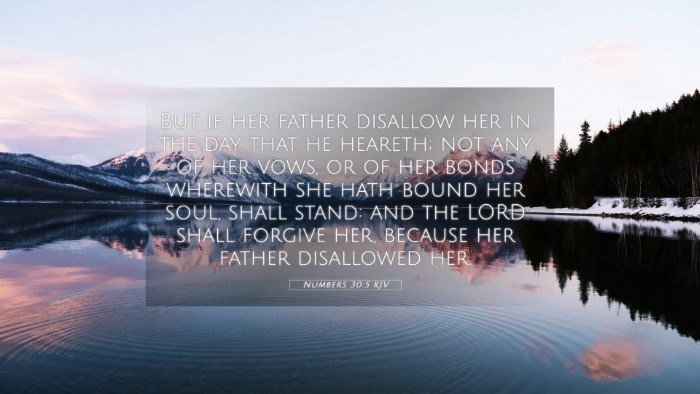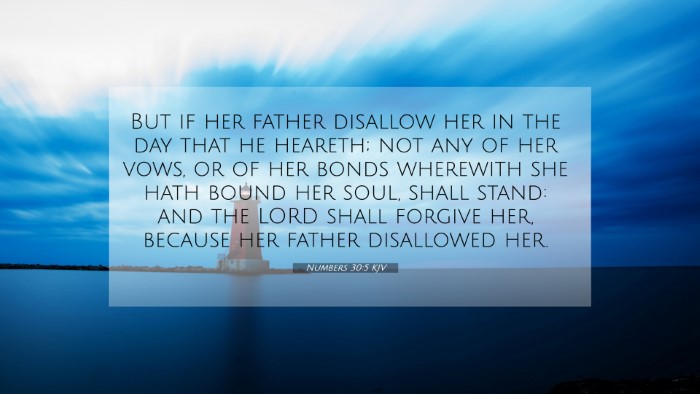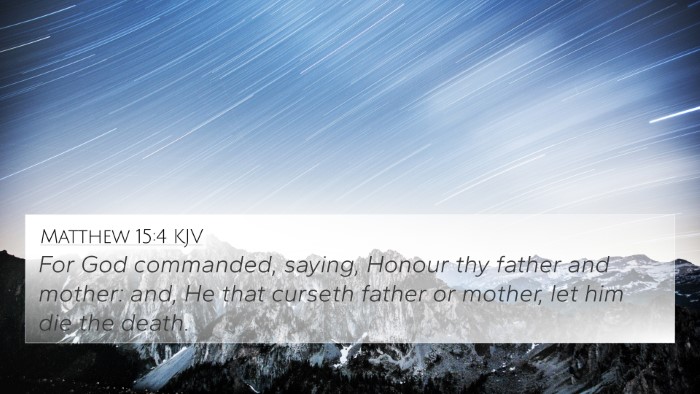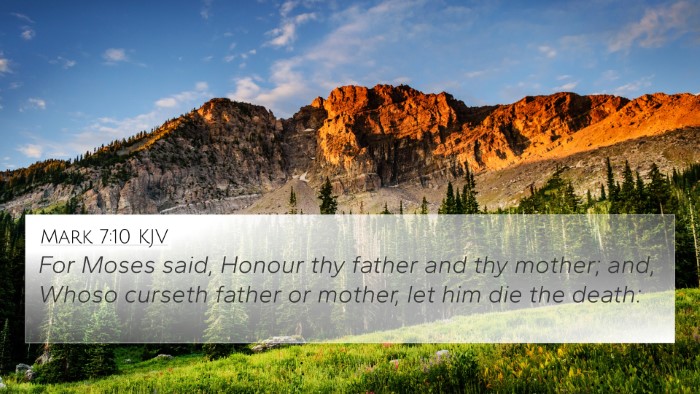Understanding Numbers 30:5
Bible Verse: Numbers 30:5 - "But if her father disallows her in the day that he hears; not any of her vows, or of her bonds wherewith she hath bound her soul, shall stand: and the Lord shall forgive her, because her father disallowed her."
Verse Meaning Summary
This verse deals with the vows made by daughters and the authority of their fathers over such vows. It underscores the importance of familial authority and accountability in the community of Israel. A daughter’s vows can be nullified by her father when he hears about them, thus emphasizing the dynamics of father-daughter relationships in matters of spiritual and social commitments.
Key Insights from Commentaries
-
Matthew Henry:
Henry explains that this verse reveals a father’s authority over his daughter’s vows. If the father hears of the vow and disapproves, it carries weight, emphasizing the role of parental supervision in guiding the spiritual lives of children. The forgiveness aspect indicates God's compassion and understanding toward a daughter’s situation.
-
Albert Barnes:
Barnes highlights that the regulation concerning a father's right to disallow vows serves to uphold family structure and social order. He emphasizes how this law protects young women from potentially rash commitments without mature guidance and consideration.
-
Adam Clarke:
Clarke elaborates on the implications of this verse, noting the societal context of the time. A father’s intervention not only serves as a protective measure but also shows the sacredness of vows made. Clarke points out that the outcome of disallowing vows reflects the importance of communal and family integrity in faith practices.
Bible Verse Cross-References
To deepen the understanding of Numbers 30:5, here are relevant cross-references:
- Exodus 20:12: "Honor your father and mother, that your days may be long in the land that the Lord your God is giving you." - Emphasizing the significant role of family authority.
- Deuteronomy 23:23: "You shall be careful to perform what goes out from your lips." - Relating to the sanctity of vows.
- Proverbs 19:20: "Listen to advice and accept instruction, that you may gain wisdom in the future." - Highlighting the importance of counsel, especially from parents.
- 1 Corinthians 7:34: "There is a difference between a wife and a virgin. The unmarried woman cares for the things of the Lord, that she may be holy both in body and in spirit." - Touching upon the implications of unmarried women’s vows.
- Mark 7:10: "For Moses said, 'Honor your father and your mother'; and, 'Whoever reviles father or mother must surely die.'" - Reinforcing the theme of parental authority.
- Matthew 15:4: "For God commanded, 'Honor your father and your mother,' and, 'Whoever reviles father or mother must die.'" - Further linking the command to honor parents with respect to vows.
- Luke 2:51: "And he went down with them and came to Nazareth and was submissive to them. And his mother treasured up all these things in her heart." - Illustrating the obedience to parental authority.
Thematic Connections
The theme of parental authority and communal responsibility in spiritual matters resonates strongly throughout the Bible. These inter-Biblical dialogues across scriptures emphasize:
- Obedience to gender-specific guidance.
- The significance of vows and their implications in spiritual life.
- The relational dynamics between parents and children.
- The community's role in upholding individual commitments.
Cross-Referencing Biblical Texts
Cross-referencing serves as a vital tool for deeper comprehension of scripture. Here are a few methods for effective Bible cross-referencing:
- Utilizing a Bible concordance to locate themes and similar verses.
- Employing a Bible cross-reference guide that associates verses with shared concepts.
- Incorporating Bible chain references for thematic studies, enhancing understanding of broader biblical narratives.
Conclusion
The directives given in Numbers 30:5 are clear about the importance of familial structure in spiritual commitments. This verse opens the door to broader discussions on themes of authority, accountability, and the sacredness of vows in the faith community. The cross-references provided not only enhance understanding but also encourage the study of similar themes throughout the scripture, creating a richer tapestry of biblical knowledge and connections.






